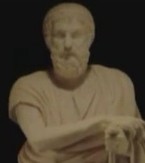Epicurus’ Citations To Homer
 As Norman DeWitt explained, there are several passages by Homer of particular interest to the study of Epicurean philosophy:
As Norman DeWitt explained, there are several passages by Homer of particular interest to the study of Epicurean philosophy:
… Epicurus possessed another weapon capable of administering perhaps a meaner sting. He was able to quote a passage from the Phaeacian episode in the Odyssey which seemed to be a pronouncement of the hedonistic creed in the very terminology of the Platonic-Peripatetic schools. Not only the scholium on this passage but a bevy of other notices from antiquity inform us that upon this authority Epicurus based his espousal of pleasure as the end or telos. This view, it need hardly be interposed, is only superficially true. The real basis of his hedonism was the sanction of Nature herself, which for him furnished the norm. The persistence of Homer’s name in the tradition is merely a tribute to its superior news value and to the smartness of the sting so administered.
The nature of the sting will be better understood if two points be recalled to mind: first, that for the Greek public everywhere the poems of Homer enjoyed the status of a textbook on morals and were revered as a sort of Bible; the second point is the fact that the Peripatetic school made a specialty of the study of Homer, as was noted in the case of Praxiphanes at Rhodes.
The Phaeacian king is addressed and the speaker is Odysseus: “Verily this is a beautiful thing, to be listening to a bard such as this man is, with a voice like the gods. For to my mind, I say, no consummation (telos) is nearer perfection than when rejoicing (euphrosune) prevails among the whole people and the banqueters seated in order in the halls are listening to a bard, when the tables abound in bread and meats and the wine-bearer draws the sweet drink from the mixing bowl and pours it into the cups.”
The sting in this quotation is not single but multiple. To the populace, which was later incited against Epicurus, it was sacrilege, equivalent to quoting the Bible in certain circles in support of evolution. To the rival philosophers it must have been most disconcerting, not only because of the fortuitous sanction of the word telos to denote pleasure, but also because of the term euphrosune, which to Plato and Aristotle signified a pleasure superior to hedone and denoted the enjoyment of pure reason contemplating absolute truth. As an addition to the irritation it may be mentioned that Aristotle himself had quoted the passage to demonstrate the need of music in the best education. If Homer was to be an authority on this question, why not on that of the end or telos?
If this assumption be correct that during this adventurous sojourn in Mytilene Epicurus was deliberately needling his adversaries, a second item also deserves mention under the Homeric heading. The text of the Iliad, 24.525-526, reads: “This is the lot the gods have apportioned to miserable mortals, to live in sorrow, but no care have they themselves.” To the second of these lines is found a scholium: “From this Epicurus infers that the incorruptible and blissful being has neither cares nor worries, nor occasions them to others and for this reason is susceptible of neither anger nor gratitude.” These will be recognized as the words of the first of the Authorized Doctrines, and little doubt need exist that the alert and learned Epicurus quoted also the passages in which Homer speaks of the blessed gods as “living at ease,” nor that he read these to mean that the gods enjoyed freedom from toil or worry (aponia).
While appealing to Homer as an authority in his teaching concerning pleasure and the life and nature of the gods, Epicurus was able also to quote Sophocles in proof of a companion principle, that pain was to be classed as evil. To this end he cited, and possibly in Mytilene, the following couplet of the Trachiniae, which describes the agonies of Heracles perishing in the fateful shirt of Nessus: “Biting, screaming in pain, and all around his moans were echoed by Locria’s mountainous rocks and Euboea’s beetling headlands.” He may also have cited the humorous passage of Homer where the wounded god of war is described as “bellowing like nine thousand or ten thousand men when they raise the battle-cry, joining in the strife of battle.” If Ares himself, like Heracles, bellowed with pain when wounded, why should not the wise man moan and wail aloud when on the rack? Pain was manifestly evil just as pleasure was manifestly good.
It is difficult to think of tricks of controversy better calculated than these to exasperate adversaries and to afford them grounds for arousing the populace.
From Epicurus and His Philosophy, Chapter 4.
